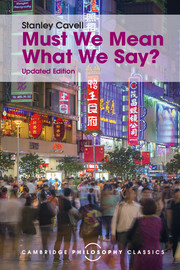Book contents
- Frontmatter
- Dedication
- Contents
- Permissions
- Acknowledgements
- Preface to this edition
- Preface to updated edition of Must We Mean What We Say?
- Foreword: An audience for philosophy
- 1 Must we mean what we say?
- 2 The availability of Wittgenstein's later philosophy
- 3 Aesthetic problems of modern philosophy
- 4 Austin at criticism
- 5 Ending the waiting game: A reading of Beckett's Endgame
- 6 Kierkegaard's On Authority and Revelation
- 7 Music discomposed
- 8 A matter of meaning it
- 9 Knowing and acknowledging
- 10 The avoidance of love: A reading of King Lear
- Thematic index
- Index of names
2 - The availability of Wittgenstein's later philosophy
Published online by Cambridge University Press: 05 November 2015
- Frontmatter
- Dedication
- Contents
- Permissions
- Acknowledgements
- Preface to this edition
- Preface to updated edition of Must We Mean What We Say?
- Foreword: An audience for philosophy
- 1 Must we mean what we say?
- 2 The availability of Wittgenstein's later philosophy
- 3 Aesthetic problems of modern philosophy
- 4 Austin at criticism
- 5 Ending the waiting game: A reading of Beckett's Endgame
- 6 Kierkegaard's On Authority and Revelation
- 7 Music discomposed
- 8 A matter of meaning it
- 9 Knowing and acknowledging
- 10 The avoidance of love: A reading of King Lear
- Thematic index
- Index of names
Summary
Epochs are in accord with themselves only if the crowd comes into these radiant confessionals which are the theatres or the arenas, and as much as possible, … to listen to its own confessions of cowardice and sacrifice, of hate and passion…. For there is no theatre which is not prophecy. Not this false divination which gives names and dates, but true prophecy, that which reveals to men these surprising truths: that the living must live, that the living must die, that autumn must follow summer, spring follow winter, that there are four elements, that there is happiness, that there are innumerable miseries, that life is a reality, that it is a dream, that man lives in peace, that man lives on blood; in short, those things they will never know.
—JEAN GIRAUDOUXIn June of 1929 Wittgenstein was awarded a Ph.D. from Cambridge University, having returned to England, and to philosophy, less than a year earlier. His examiners were Russell and Moore, and for his dissertation he had submitted his Tractatus, published some seven or eight years earlier, written earlier than that, and now famous. The following month, he refused to read a paper (“Some Remarks on Logical Form”) which he had prepared for the joint session of the Mind Association and Aristotelian Society, and which obviously goes with the ideas he had worked out in the Tractatus. Years later he said to Moore “something to the effect that, when he wrote [the paper on logical form] he was getting new ideas about which he was still confused, and that he did not think it deserved any attention.”
In January of 1930 he began lecturing at Cambridge about those new ideas, and in the academic session of 1933–1934 he dictated a set of notes in conjunction with his lectures; during 1934–1935 he dictated privately another manuscript, longer than the former, more continuously evolving and much closer in style to the Philosophical Investigations.
- Type
- Chapter
- Information
- Must We Mean What We Say?A Book of Essays, pp. 41 - 67Publisher: Cambridge University PressPrint publication year: 2015
- 3
- Cited by

